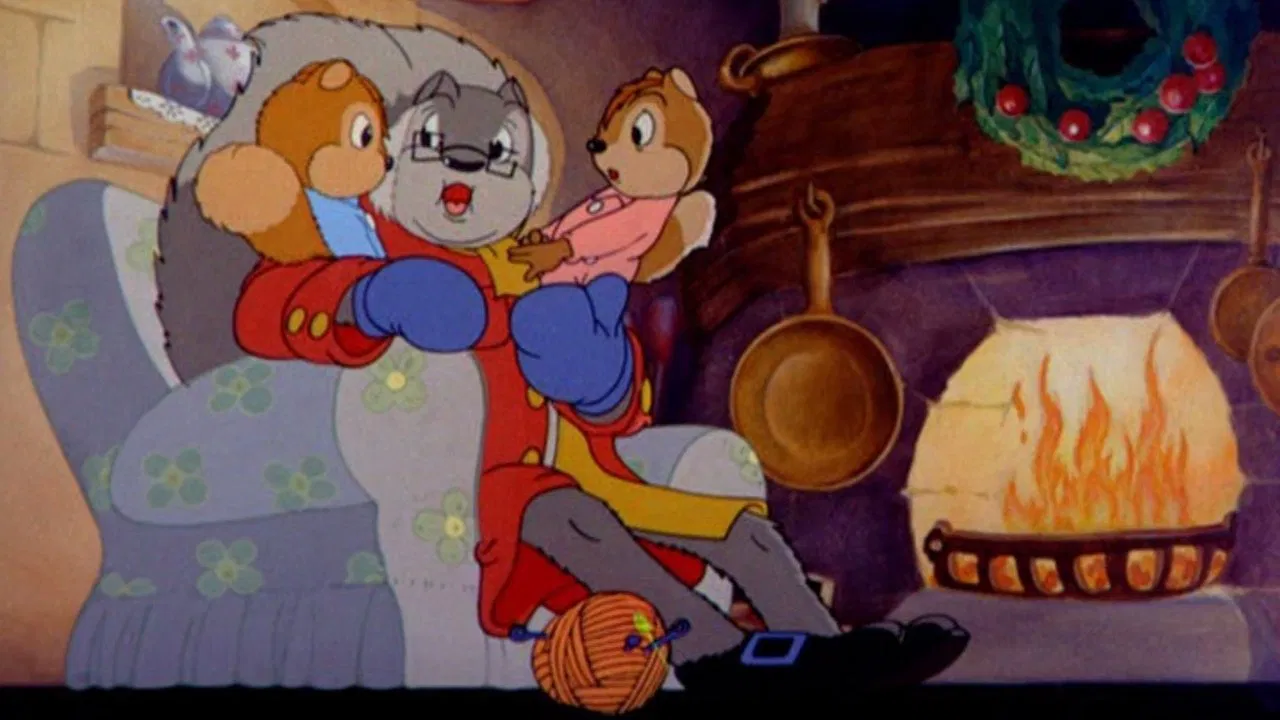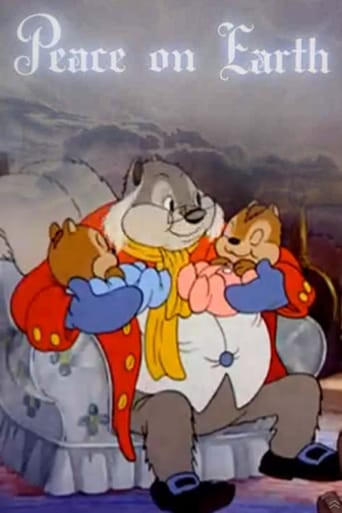


Sick Product of a Sick System
... View MoreSave your money for something good and enjoyable
... View MoreDon't Believe the Hype
... View MoreThe storyline feels a little thin and moth-eaten in parts but this sequel is plenty of fun.
... View MoreWhen Hugh Harman made PEACE ON EARTH, he intended it to be an ambitious anti-war film. He later said he wanted to make it a longer 2-reel cartoon. Nonetheless it turned out to be one of the greatest and most chilling cartoons to come from Hollywood's animation golden age.Despite being an anti-war film from the late 1930's, the message isn't very clear, beyond demonstrating man's inability to maintain a peaceful society with animals succeeding after man's demise. There are religious icons sprinkled throughout the film, but there aren't used to preach any messages, as one would suspect from a film of this kind. Their presence in the film also seem vague. The elder squirrel's recollections of man's war echoes the horrors of World War I, which was still strongly in the public's recollection.Harman and Ising were known for trying to compete with Disney. They were really the only men that come close to replicating Disney's polished animation, but storytelling was not their strength. Nonetheless, this is one of Harman's best films. Unlike most Christmas films, this one can be unnerving to some audiences due to its grim war sequences and outcomes.Remade by Hannah-Barbera in 1955 as GOOD WILL TO MEN with updated horrific war imagery reflecting the Cold War and a more clear cut religious message.
... View MoreThis is a beautifully-made and quite poignant animated short film, but while no one can doubt the sincerity of the sentiment, it reduces the discussion of war to a level of simplification unfitting for the subject. To diminish such a topic to a five-minute short, and to aim it at children using anthropomorphic squirrels (or mice, in the 1950 remake "Good Will to Men") is the essence of propaganda.In 1939, Europe was torn by Nazi aggression, but the United States had yet to enter the war. Many people of good conscience were arguing that the U.S. should remain neutral, essentially ceding all of Europe to the tender mercies of Adolf Hitler. It was in this climate that "Peace on Earth" was made, arguing that both sides in a conflict are morally equivalent, since both have violated the commandment "Thou Shalt Not Kill" (which is more correctly translated as "Thou Shalt Not Commit Murder", a very different thing.) It's a good thing that minds of more mature reasoning decided that it would be very necessary for us to fight the Axis powers. "Peace on Earth" comes from the same sort of personality that states in all earnestness that "war never solves anything" while conveniently ignoring the many things that war has indeed solved: tyranny, oppression, slavery, genocide, fascism, Nazism, and (in the cold war) Soviet communism; the elimination of totalitarian Islamist extremism is still underway. Peace is not just the absence of war, but the presence of justice, and there are some things for which is is worth while to fight or even die. Diplomacy is of course preferable to armed conflict, but if honorable goals are abandoned in the course of diplomatic negotiation, then the result is simply defeat by a different means, and the justice that was desired was perhaps never deserved.
... View MoreI'm amazed at movies whose content preaches one thing and their form uses exactly the forbidden paths.Often it is a teen film about being unique, about not following formulas, but is presented in a rigid formulaic method. Or it may be a comedy that makes fun of a certain type of person but depends on that very same person to buy tickets.It is such a common situation, I have stopped remarking on it unless the effect is particularly striking. It is here.On its surface, this has heart. It is a strong antiwar statement that uses Christmas, the Bible and good old family/community values to argue about the stupidity of war.(Let's set aside the context: Europe was at war all the uniforms here are European and America was divided about entering the war except through its clients. Already by this time, the war would be all but over if America hadn't committed to finance Russia and Britain. A huge sector of the US population wanted to remain "neutral," meaning in that context, unviolent. In its day, this would have been seen as a suggestion to not oppose Hitler.)Here's the thing that rankles me as a lucid moviewatcher. Look carefully at the argument. It is based on values that do not transcend cultures. In other words, it is saying that the guys that are fighting are doing so about things that don't matter because they are not *these things* over here that we know and trust and love.Eventually, the sentiments in this cartoon would be behind the US entry into the war: the US as the preservers of goodness. So it was a good thing in retrospect, for a generation. And then the questions begin.Ted's Evaluation -- 2 of 3: Has some interesting elements.
... View MoreHugh Harman was an animation director who essentially produced sentimental and "cute" cartoons. Looking at his work prior to "Peace on Earth," I don't think anyone would have ever anticipated it. Framed by a "cute" beginning and ending, Harman presents a fable so grim and thought-provoking one would think somehow a John and Faith Hubley cartoon from 20 years in the future somehow got mixed into this film.This is not, however, a Hubley film, and this was not the paranoid, stressed 50's and 60's, but the late 1930's. All this makes Harman's film all the more remarkable.The plot revolves around the typically anthropomorphic animals (in this case, squirrels) asking their grandfather (brilliantly voiced by Mel Blanc--that man was in just about every classic cartoon there was) what the "men" are in the line "Peace on Earth, good will to men." He then tells them a telescoped history of the human race, focusing on the seemingly endless succession of wars men waged.The succession turns out not to be endless, and we see the last war, leading to the last two soldiers killing each other in what was perhaps the darkest, most violent scene ever put in a cartoon up to this time (it still would be disturbing for small children--it was to me when I was a child). The grandfather then tells how the animals, directed by the Bible (which the owl notes seems like a good book, but it was a shame men didn't use it), rebuild the world.[end spoilers]On the eve of World War II, the above must have seemed fairly profound. Unfortunately, events in the 64 years since (and up to the present moment) have ensured this cartoon's relevancy has never gone away. In the end the seemingly shallow Harmanian cuteness of the opening is revealed to be the deepness of innocence, love, and peace.At the very end, the words "Peace on Earth" are flashed on the screen, but this time, not followed by "good will to men," because in the story of the cartoon that's not possible. It's Harman's final warning, and one that remains both intensely moving and disturbing.This is a cartoon that should be seen by everyone, and especially adults.
... View More